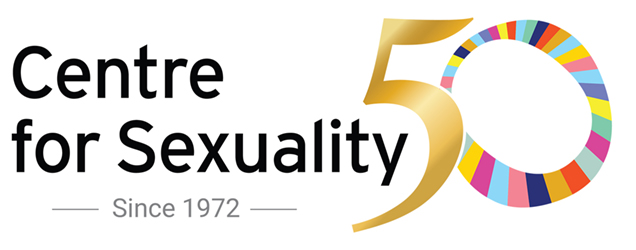Centre for Sexuality – Our History
The Calgary Birth Control Association (CBCA) began in 1972 as a movement unfolded. It was an exciting time in the feminist movement: Women were gaining reproductive freedoms. Ms. Magazine began regular publication. The National Action Committee on the Status of Women formed in Canada. At the same time, the gay rights movement emerged as homosexuality was decriminalized. The Stonewall Riots were the catalyst; pride marches and the fight for equal rights began.
Birth control was legalized in 1969 and women wanted to know about their newfound rights. CBCA was founded by a group of women in the basement of the Unitarian Church. From the beginning, it was an agency with a long-term vision and a focus beyond reproductive rights. Their mandate included sexuality education in schools and from the start, broad issues of sexuality were part of their work.
In the 1972 Annual Report, CBCA reported on a survey conducted that year that found a greater acceptance of birth control and sex education than had previously been supposed. That same report describes the first year, talking about people calling and stopping in about everything from term papers to venereal disease (VD). By the end of the year, contraception information was two-thirds of the work of the agency.
There was a rural team that travelled thousands of miles in southern Alberta providing information, first to parents, then to teens. They were big hits at colleges in places such as Olds, Red Deer, Medicine Hat and Lethbridge.
CBCA undertook door-to-door education in low-income neighbourhoods and a community education program focusing on long-term education. They worked with young prisoners at the Calgary Correctional Institution (CYOC), staff and inmates at group homes for youth with mental health challenges, the staff of Vocational Rehabilitation and Research Institute (now Vecova), and other teen groups. They also ran a group on personal sexuality.
There was a bold vision which encompassed prevention right from the beginning. The agency found creative ways of reaching people, especially youth. It was also an organization of leadership in collaboration. They held extravaganzas for birth control for teens, sponsored by radio stations and attended by more than 400 teenagers. There was a teen booth at Stampede with large displays, including an eye-catching contraceptive mobile.
At the same time, there was constant furor over the issue of abortion. Despite being an organization with a broad prevention vision, this issue defined much of the organization for the decades to come.
There was great media attention around the activities of CBCA. Whether it was the Condom Caper (advertising they would hand out condoms to the first 100 men that came to CBCA), having a booth at the Calgary Stampede (which had to be pre-approved) or the funding challenges at City Hall, there was constant scrutiny.
In 1983 City Council talked about cutting funding to CBCA because the organization brought Dr. Henry Morgentaler to speak. Bringing Morgentaler was called vulgar, insulting, and politically stupid by one Alderman. However, a fierce defender emerged. Alderman Craig Reid said: “CBCA needed to bring Dr. Morgentaler into our midst because they are fighting ignorance.”
The media, for the most part, were supportive. In 1987, a Sun editorial said: “the CBCA has provided a valuable service to this community and has made a contribution to the very delicate area of sexual responsibility.”
In 1975, we started providing comprehensive sexual health education in Calgary schools. Today, we reach over 10,000 students annually, providing them with skills and tools to achieve healthy sexuality and engage in healthy relationships.
In 1988, Canada no longer had an abortion law, so the work of CBCA changed. Prior to 1988, women had to get three doctors to sign off on an abortion and there had to be a referral. CBCA had played a vital role as a referral service, with up to 100 volunteers providing options counselling to countless women in those years.
The other significant role we have played is in the work of bullying and Two-Spirit and LGBTQ+ inclusion. CBCA, through its counselling, always supported 2SLGBTQ+ people, albeit quietly in the beginning. The agency was always at the forefront of coalitions that represented inclusive equality.
In 1995, CBCA started a group for women who were questioning their sexual orientation. In 1996, teachers began to identify the need for anti-homophobia work in schools to combat bullying. CBCA was called to action, and since 1997 we have been going into public high schools with this program. Today, its content is much broader; our program, Diversity and Respecting Everyone, comes from an anti-oppressive framework and makes the issue of 2SLGBTQ+ marginalization relatable to diverse student communities.
Over the years, much of the work and many of the community partners remained the same. We provide education in the same schools as in 1975 and many of the original community groups are still partners in our work.
A significant role of the organization throughout the years has been our work in collaboration with other organizations, and our work in coalitions on broader human rights issues. The Pro-Choice Coalition, the Coalition on Human Rights, Pride, and many other groups that formed were fundamental to the work of CBCA.
The seemingly unrelenting backlash against feminism, and the uncertainty of women’s reproductive rights and the fight for 2SLGBTQ+ rights in the 1990s and 2000s kept the organization very marginalized. Traditional funders were brave enough to provide support and saw the results of our work, but corporate donations were almost impossible. It was difficult to attract new funding as many funders didn’t see how sexuality education or counselling fit with their funding.
In 2005, as we continued to struggle to attract and sustain funding, we took a bold move and held a fundraiser with feminist icon Gloria Steinem. We rallied a few sponsors and found a kind and affordable event planner to help. We ended up with 1,000 women and a few men at the Stampede Grounds for that event. It was the reinvention of the organization.
We followed up in 2006 with Jane Fonda. At that event, we announced our name change to the Calgary Sexual Health Centre. This was happening across the country – organizations changing from Planned Parenthoods or birth control organizations to sexual health. It was a stab at legitimacy and was more inclusive of our work.
When we finally started to stabilize, we quickly realized that we needed to be more strategic to maximize our impact. We were serving individuals, but often two at a time. It was exhausting for staff and only had an effect on a few participants.
Our sexual health education work was stable and continued to grow. We started to find ways to impact marginalized youth who were not consistently in school through community partnerships. Finally, we figured out a way to decrease the need for us to go to group homes and other programs over and over again, when all the time the program staff were sitting in the room. We knew we could have a bigger impact if we trained the staff from those programs instead of the clients. In 2009 we opened a Training Centre and we have reached over 50,000 professionals with workshops on a wide range of topics. This work now includes an organizational audit tool as well.
One of our strengths has always been to customize our programs to effectively reach the community we are serving, and that was fully realized with the establishment of the WiseGuyz program.
We always talk about our organization moving up from its roots and expanding out from there, not being a farm of small unconnected trees. Today, things are different and the same. To this day, our society still has not normalized sexuality. The shame and guilt associated is still ever present. We need to give people tools and permission to be agents of their sexuality, to own their identity, their whole identity.
Many strategic plans have talked about us becoming the go-to organization. Perhaps we always have been. Just like in 1972, we see the value in providing longer term programs. We see the value on reaching beyond Calgary and having more of a focus. And we remain diligent in reaching youth any way we can, because we know how important prevention work is. The work of our agency is recognized as integral, and our leadership role is recognized.

